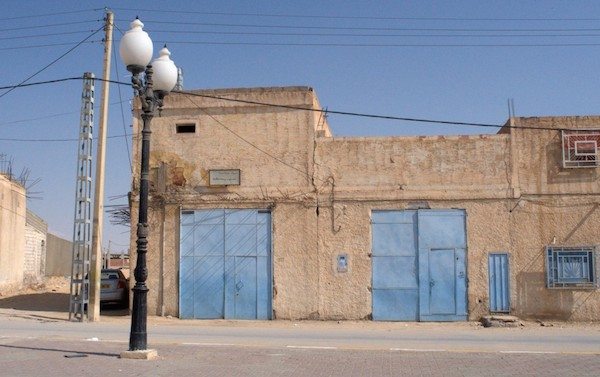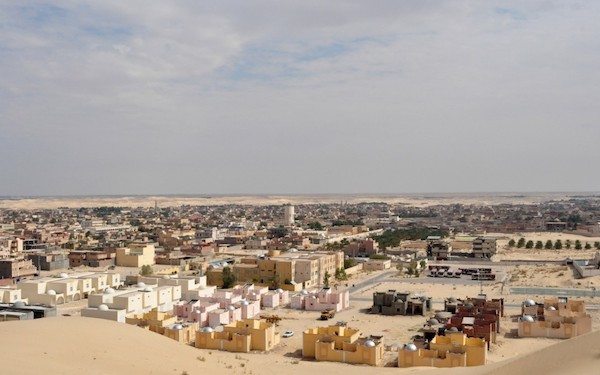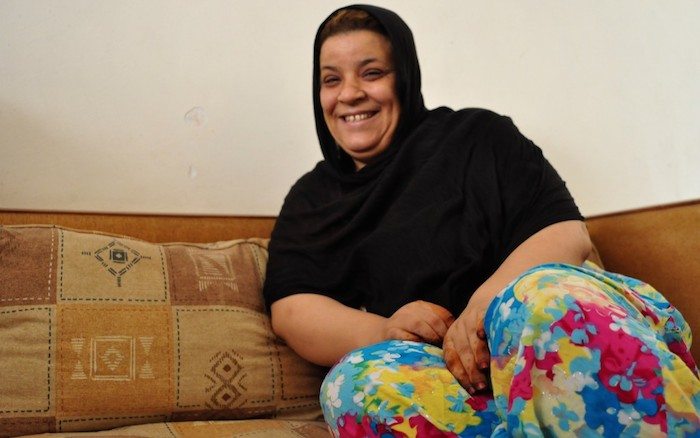A hammam in the desert
Nora is running a hammam in El Oued, a merchant city located 600 km south of Algiers, close to the Tunisian border. Carole Filiu interviewed the woman who has become a real pillar in her community.
“I don’t really like the desert, you know. I prefer the forests, the rivers,” says Nora before bursting out in laughter. She was born 45 years ago in El Oued (Oued Souf, as the Algerians call it) and has always lived here, in the desert. Around the city are the sand dunes of Grand Erg Oriental; on the roof of each house, a dome reflecting the sunrays relieves the scorching heat. During summer, temperatures easily reach 50°C. “You can’t even set foot on the ground,” Nora says, “it’s just too hot.”
“I don’t really like the desert, you know. I prefer the forests, the rivers.”
The house is silent this morning. Lzhar and Nora’s six children are gone, either to school or to university. Nora is taking her morning break. In 2002, she opened her own business, a hammam located right under her house. She hasn’t stopped working ever since. “It’s getting very tiring because I also have to take care of everything at home. But on the other hand it’s a real pleasure. I meet a lot of people there and women come to talk to me,” she smiles. Nora inherited the house upon her father’s death and decided to turn the ground floor into a hammam. Her husband Lzhar, an architect, designed its outline and interior. “We live just upstairs. It’s as if I were at home, and my husband has no issue with me working there.”

Comfortably sitting in an armchair, Nora enjoys a lengthy conversation in French. One of nine sisters, she learned this language with the aim of becoming a French teacher, but had to give up studying when she got married in 1987. “At the time, there were even less childcare facilities, so basically there was no choice,” she explains. “Besides, nobody would want to marry a working woman at the time. Things have changed since then. Now, given the unemployment, men are looking for women with a job, even more so one with a teaching position, for the stability of the income.” The economic reality finally took over the conservative values of the local families. “The men need the money of the women,” Nora says.
“The men need the money of the women.”
Nora can talk for hours about her trips to Damascus and Tunisia. She would also love to go back to France, a country she visited during the 80s. At the time, she was friends with French teachers who worked in Algeria, but all packed up at the beginning of the 90s. “Terrorism had everybody leave Algeria. There used to be journalists, intellectuals and the like. We never saw them again,” she regrets.
A shadow darkens her face as she remembers those times, during which her family members had to lock themselves into their home night and day. “Not so long ago, I wouldn’t have invited people I didn’t know to my home. You had to be wary of everybody. You never knew who would go after you. So much bloodshed for nothing.” According to Nora, terrorism ended thanks to President Bouteflika, whose portrait hangs on the wall of her hammam’s lobby, like in many other places and shops in Algeria.
“Something attracts me here. Apart from the scorching summer heat, life is very simple and you don’t have many troubles.”
Nora gets up, brings tea from the kitchen and, on her way, swipes the flies which have invaded the living room as the dates season started. Thoughts are crossing her mind. “I don’t like the desert that much, it’s true, but there is still something that attracts me here. Apart from the scorching summer heat, life is very simple and you don’t have many troubles.”
Midday is coming. Lzhar is back from work and the children have returned from school. The house is alive again. The girls help out in the kitchen while Nora goes down to the hammam, which remains open all day. Her friends and other female customers are waiting for her to talk about their problems. Year after year, Nora’s listening skills has made her the new counsellor in town.
Little by little, the streets are emptying outside. Another hot afternoon in the desert starts.

This text was intially published on the blog Fatea, and was translated from French by Gregory Dziedzic.
4 thoughts on “A hammam in the desert”
Leave a Reply
You must be logged in to post a comment.








FYI:
https://plus.google.com/u/0/100146646232137568790/posts/V4VCiVYuT3Q
The article is in fact very interesting. I am 24 and have a 16-month-old. My husband is American and I was born in Costa Rica but raised in America after the age of 9. I find myself agreeing with the ways of the French. I have practiced the crying out method for sleep training and recently started doing time outs to curb my son’s habit of pushing and hitting. Does it break my heart to hear him cry? Yes, but I do it because I feel confident that it is the best thing I can do for him.